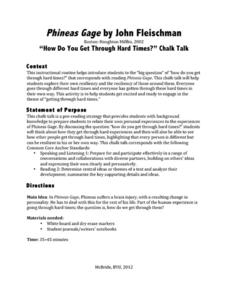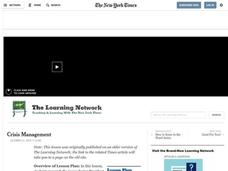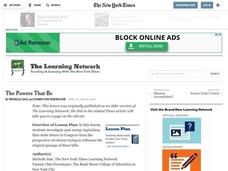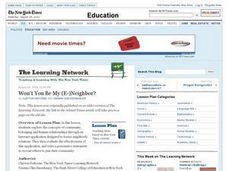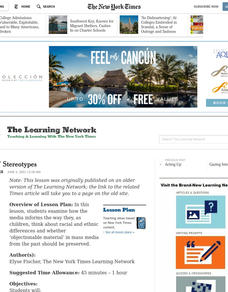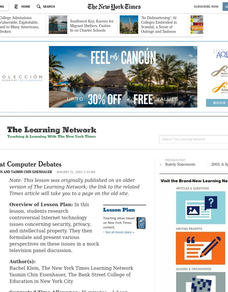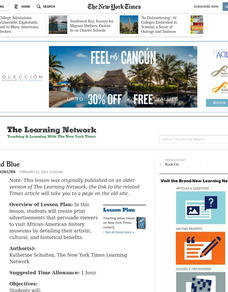Curated OER
Phineas Gage: “How Do You Get Through Hard Times?” Chalk Talk
Hold a discussion in writing about coping strategies to prepare your pupils for reading Phineas Gage: A Gruesome but True Story About Brain Science by John Fleischman. After journaling, pupils come up in an organized fashion and write...
Curated OER
Monkey See, Monkey Do
Students consider the influence of bullies and map the social ecosystem of their schools. They create lifelines that compare baboon and human development and write an essay that considers the relationship between psychosocial development...
Curated OER
The Aftermath of War
Students share their opinions on the war in Iraq. After reading an article, they identify the thoughts of President Bush on the conflict. In groups, they share their opinions for and against current United States policy in Iraq and the...
Curated OER
Crisis Management
Learners research the issues facing President Bush and write short political commentaries predicting what course the president take. For homework, they write editorials stating what they think the president should do to best serve the...
Curated OER
The Powers That Be
Students investigate past energy legislation, then write letters to Congress from the perspective of citizens trying to influence the original passage of these bills. Each small group does their research using a website imbedded in this...
Curated OER
Won't You Be My (E-)Neighbor?
Students explore the concepts of community, belonging and human relationships through an Internet application designed to foster neighborly relations and write a persuasive statement to recruit others to join their community.
Professional Development Institute
Which Is More Important?
Think about the roles of hunters and squaws in Elizabeth George Speare's The Sign of the Beaver. Whose work is more important? Young writers compare Attean and Matt's reaction to each gender's role, as well as arguing their opinion...
Curated OER
Sufferin' Stereotypes
Examine how the media informs the way your class thinks about racial and ethnic differences. Additionally, middle and high schoolers discuss whether "objectionable material" in mass media from the past should be preserved.
Curated OER
The Great Computer Debates
Learners research controversial Internet technology issues concerning security, privacy, and intellectual property. They formulate and present various perspectives on these issues in a mock television panel discussion.
Curated OER
(In)fringe Benefits?
Students explore the "Copy Left" movement, then analyze and discuss the key legal issues regarding intellectual property and copyright legislation in the context of global communication and the Internet.
Curated OER
Trying Teens
Students explore the court cases and legal organizations that were instrumental in creating a system of juvenile justice in the United States, then present their findings in a composite timeline.
Curated OER
The Princess's Point of View
Everyone wants to be part of a royal family. Let your pupils experience the privilege of royalty by rewriting the story The Frog Prince from the point of view of the princess. While the story line remains the same, perspective is bound...
Curated OER
Brainstorm This!
Students discuss the advantages and types of brainstorming as a prewriting tool. They experiment with different styles of brainstorming and produce prewriting samples for assessment.
Curated OER
Black and Blue
Pupils create print advertisements that persuade viewers to visit African-American history museums by detailing their artistic, cultural, and historical benefits.


